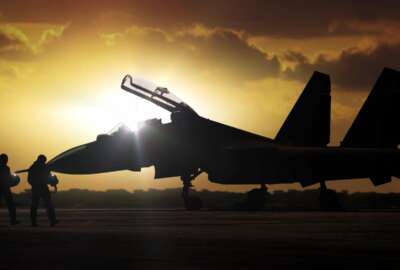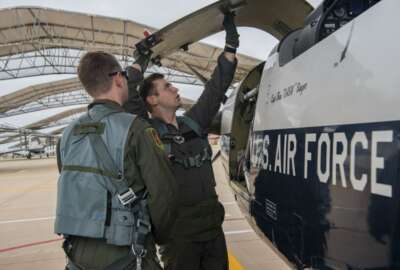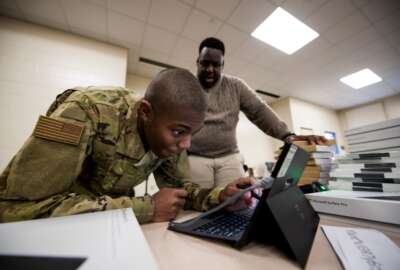
Coronavirus is changing the way the Air Force thinks about training
The Air Force adapted its survival training to COVID-19 and it likes the results.
The Air Force is getting a push from coronavirus on revamping its rigorous survival training, which may lead to changes in other service courses in the future.
The Air Force Survival, Evasion, Resistance and Escape (SERE) training was a 26 day, in-person set of courses for airmen and special operations forces that may be in high risk of capture during a combat scenario. But when COVID-19 struck, those courses — which involve drills in national forests, urban environments and water survival — needed to be revamped.
That overhaul is helping SERE training move to less than three weeks, something the Air Force wanted before coronavirus hit. The disease expedited the process.
“These changes will provide more tailored training for our airmen while delivering them to their combat units more quickly,” Maj. Gen. Craig Wills, 19th Air Force commander said in a statement. “This is an exciting development that saves our most valuable resource — our airmen’s time, while preparing our Air Force to better meet the demands of the 21st century fight.”
As the COVID-19 outbreak continues, the troops coming into SERE need to be quarantined for 14 days, per Defense Department regulations, before they could be in contact with other people.
“We knew we had to continue training, but what do you do with people for 14 days?” Col. Carlos Brown, 336th Training Group commander told Federal News Network. “You don’t just put them in a dorm room or hotel room on base waiting to start training. We very rapidly took a lot of our platform instruction and put it into study guides or books.”
SERE’s 25 hours of academics were condensed into home study for self-paced work. Students dialed in to calls with instructors three times a week to ask questions.
Brown said with the self-paced study questions were more detailed and thoughtful.
Quantitatively, things got better too.
“Tests scores have either met the previous scores or exceeded them,” Brown said. “The self-paced aspect helps because people learn with different learning styles at different times. I’m a morning person. You might have someone who likes to study from 10 in the morning to two in the afternoon. This frees them up to do it how they want to do it.”
Of course, the audience is captive during quarantine. For post-quarantine courses, students might get materials 30 days before a course to work on at their leisure.
The COVID training model SERE is using will continue during DoD’s stop movement order. SERE instructors want to move to a new shorter training 90 days after the order ends.
“We’ll need the 90 days to do some summative assessment analysis. I suspect that will start up this summer,” Brown said.
Brown said SERE’s new approach is reflective of the Air Force’s overall mission of making training more adaptive.
“The more we can save airmen’s time the more we can save training time, that’s just equating to dollars, which is important,” Brown said. “The quality of training if you look back the way a person learned 20 years ago versus the way this generation learns you don’t need brick and mortar or paper textbooks, you can use an iPad.”
Outside of the 25 academic hours though, SERE training is experiential and there will be no substitute for that. Despite the training being shortened airmen will still be thrown in water, camping out in forests and everything in between to pass the course.
Copyright © 2024 Federal News Network. All rights reserved. This website is not intended for users located within the European Economic Area.
Scott Maucione is a defense reporter for Federal News Network and reports on human capital, workforce and the Defense Department at-large.
Follow @smaucioneWFED





